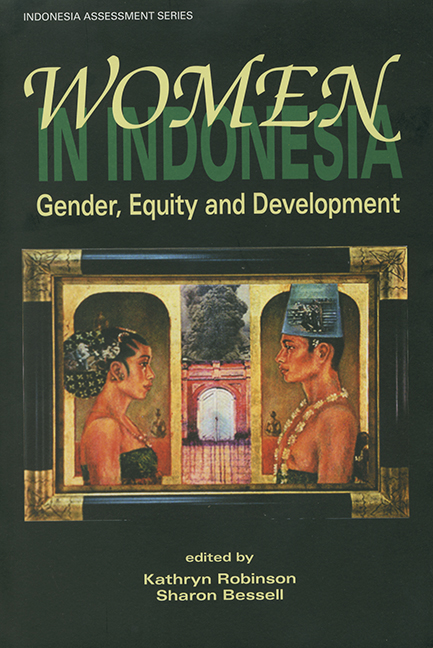Book contents
- Frontmatter
- Contents
- Tables
- Figures
- Contributors
- Acknowledgments
- Glossary
- Prologue
- 1 Introduction to the Issues
- 2 The Mega Factor in Indonesian Politics: A New President or a New Kind of Presidency?
- 3 The Downfall of President Abdurrahman Wahid: A Return to Authoritarianism?
- 4 The Year in Review: From Blind Man's Bluff to Mega Expectations
- 5 Further Comments on the Economy, with a Gender Perspective
- 6 Institution Building: An Effort to Improve Indonesian Women's Role and Status
- Commentary
- 7 Feminism in Indonesia in an International Context
- 8 Gay and Lesbi Subjectivities, National Belonging and the New Indonesia
- 9 And the Winner Is … Indonesian Women in Public Life
- 10 Indonesian Women Artists: Transcending Compliance
- 11 Literature, Mythology and Regime Change: Some Observations on Recent Indonesian Women's Writing
- 12 Women and the Labour Market during and after the Crisis
- 13 Women's International Labour Migration
- 14 Customary Institutions, Syariah Law and the Marginalisation of Indonesian Women
- 15 Women's Grassroots Movements in Indonesia: A Case Study of the PKK and Islamic Women's Organisations
- 16 Women's Activism against Violence in South Sulawesi
- 17 Gender Mainstreaming and Sex-disaggregated Data
- 18 The Changing Indonesian Household
- 19 Women, Family Planning and Decentralisation: New Variations on Old Themes
- 20 Men, Women and Community Development in East Nusa Tenggara
- References
- Index
- INDONESIA ASSESSMENT SERIES
5 - Further Comments on the Economy, with a Gender Perspective
Published online by Cambridge University Press: 21 October 2015
- Frontmatter
- Contents
- Tables
- Figures
- Contributors
- Acknowledgments
- Glossary
- Prologue
- 1 Introduction to the Issues
- 2 The Mega Factor in Indonesian Politics: A New President or a New Kind of Presidency?
- 3 The Downfall of President Abdurrahman Wahid: A Return to Authoritarianism?
- 4 The Year in Review: From Blind Man's Bluff to Mega Expectations
- 5 Further Comments on the Economy, with a Gender Perspective
- 6 Institution Building: An Effort to Improve Indonesian Women's Role and Status
- Commentary
- 7 Feminism in Indonesia in an International Context
- 8 Gay and Lesbi Subjectivities, National Belonging and the New Indonesia
- 9 And the Winner Is … Indonesian Women in Public Life
- 10 Indonesian Women Artists: Transcending Compliance
- 11 Literature, Mythology and Regime Change: Some Observations on Recent Indonesian Women's Writing
- 12 Women and the Labour Market during and after the Crisis
- 13 Women's International Labour Migration
- 14 Customary Institutions, Syariah Law and the Marginalisation of Indonesian Women
- 15 Women's Grassroots Movements in Indonesia: A Case Study of the PKK and Islamic Women's Organisations
- 16 Women's Activism against Violence in South Sulawesi
- 17 Gender Mainstreaming and Sex-disaggregated Data
- 18 The Changing Indonesian Household
- 19 Women, Family Planning and Decentralisation: New Variations on Old Themes
- 20 Men, Women and Community Development in East Nusa Tenggara
- References
- Index
- INDONESIA ASSESSMENT SERIES
Summary
Mari Pangestu's chapter on the Indonesian economy in 2000 needs very little comment. It is an excellent account of economic developments since the last volume in this series was published (Bird 2001). Perhaps I can offer some slightly different perspectives on some of the major issues. Let me give some comments on the issues raised by Mari and then turn briefly to the question of gender, equity and development.
GENERAL COMMENTS ON THE ECONOMY
Economic Growth
There is no reason to revise the 3 –3.5 per cent growth forecast for the year (writing at the start of December 2001). Apart from the numerical figure, there is a common perception that 2001 has not been a better year for the economy than 2000 (following the prospect much earlier of a steady recovery from 1999). Hopefully this is just a temporary setback, caused mainly by external circumstances such as the weakening of the global economy and the impact of the September 11 tragedy.
If Indonesia achieves 3.5 per cent growth in 2001, it will be the strongest large economy in Southeast Asia outside Vietnam – stronger, that is, than Singapore, Malaysia, Thailand and the Philippines. This is because of the size of the domestic economy and Indonesia's lesser dependence on export products such as electronics, which have become the Achilles' heel of our neighbours. Export growth in Indonesia has, however, slowed down, aggravated by the collapse of international oil and gas prices.
Domestic investments are still forthcoming but there has been little response from the major foreign investment players, who have been scared off by confused central government policies, by perceived lack of physical security at the plant or project site, and also by the prevailing weakness in the judicial system. Foreign investment approvals have skydived, and also the degree of implementation.
But there have been many small and medium-scale domestic investments to restore capacity and take advantage of new opportunities. Many of the investors do not take the trouble to go to the Investment Board (BKPM) – one can see the results in developments in Jakarta and other large cities. This is partly domestic Chinese capital parked in Singapore or Hong Kong whose owners have ongoing businesses in Indonesia. Encouraged by buoyant domestic demand they import new machines or start building new shops, shopping centres or even malls.
- Type
- Chapter
- Information
- Women in IndonesiaGender, Equity and Development, pp. 61 - 67Publisher: ISEAS–Yusof Ishak InstitutePrint publication year: 2002

